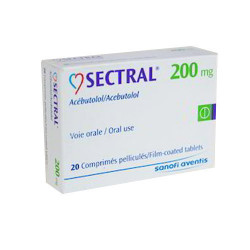
Acebutolol HCL Coupons and Discounts
Acebutolol HCL is used in treating patients with hypertension. One way to save money on the Acebutolol HCL retail cost regardless of income and insurance status is to use Acebutolol HCL coupons or discount cards from RXCoupons. Use our Acebutolol HCL coupons at your online pharmacy and receive up to 75% off the sale price each time you refill your prescription.
Mode of action and clinical pharmacology of Acebutolol HCL
Acebutolol Hydrochloride has antihypertensive, antianginal, antiarrhythmic properties. Its antihypertensive effect and antiarrhythmic properties are associated with the suppression of CNS, reduction of baroreceptor sensitivity, and ultimately, reduction in peripheral sympathetic nerve activity. The agent does not have any negative effects on lipid metabolism. Acebutolol HCl in capsules is indicated for oral administration and may be used alone or in combination with other drugs.
Why do you need to take Acebutolol HCL
Acebutolol HCL is used in treating patients with hypertension, angina pectoris (prevention of attacks), myocardial infarction, supraventricular and ventricular tachyarrhythmia, atrial fibrillation, hypertrophic cardiomyopathy, vascular headaches, tremor, anxiety, hyperthyroidism.
How Acebutolol HCL needs to be administered
Acebutolol HCL is available for oral administration. It is advised that patients start treatment divided in 2 doses (morning and evening). The recommended dose for hypertension is 400 mg (maintenance dose range: 400-800 mg/day), for angina - 200-300 mg 2 times a day. The maximum allowable dosage in elderly patients is 800 mg.
When Acebutolol HCL is contraindicated
Do NOT take Acebutolol HCL if you suffer from decompensated chronic heart failure, cardiogenic shock, sick sinus syndrome, AV block (2nd and 3rd degree), bradycardia, hypotension (including myocardial infarction).
Use Acebutolol HCL with extreme caution
Administer drug with caution if you have bronchial asthma, obstructive lung disease, impaired hepatic or renal function, peripheral vascular disease (Raynaud's disease), decompensated heart failure, diabetes, hyperthyroidism, depression, myasthenia, psoriasis. Acebutolol Hydrochloride can be used with caution in elderly patients. Pregnant and breastfeeding women should be warned against treating with Acebutolol.
Information for pregnant and breastfeeding patients
Acebutolol therapy is acceptable if the potential effect of therapy is thought to be greater than the risk to the fetus. However, if Acebutolol is used during pregnancy, breastfeeding should be stopped.
What side effects are possible with Acebutolol Hydrochloride
The most common side effects may include sleep disturbance, insomnia, nightmares, dizziness, cough, vasomotor rhinitis, headache, depression, fatigue, weakness, anxiety, seizures, eye pain, chest pain, AV block, bradycardia, hypotension. Patients with weak digestion may suffer from dyspepsia, diarrhea, constipation, nausea, anorexia, abnormal liver function. Other reactions may include allergic rash, arthralgia, myalgia, hypoglycemia.
Interaction with other drugs
Some agents like halogenated anesthetic agents, verapamil, diltiazem, quinidine may cause difficulties for Acebutolol therapy. Combinations of insulin and oral antidiabetic drugs may increase the symptoms of hypoglycemia. Acebutolol must be avoided in patients receiving monoamine oxidase inhibitor therapy. The drug may cause severe systemic reactions (anaphylaxis) associated with allergens (allergen immunotherapy, skin testing).
Learn about warnings and precautions for Acebutolol
It is necessary to decrease Acebutolol doses in elderly patients with obstructive lung diseases and bradycardia. Acebutolol therapy should not be started until 2 weeks after the discontinuation of treatment with MAOIs. It is necessary to exclude the use of alcoholic beverages during treatment with Acebutolol (to prevent the risk of orthostatic hypotension).
It is reasonable to terminate therapy with Acebutolol slowly: within at least 2 weeks. Sudden drug withdrawal can cause severe arrhythmia, myocardial infarction. It is not recommended to use Acebutolol in pediatric practice, because the safety and effectiveness of this drug has not been established in children. It is important to remember that your concentration and ability to drive may be impaired after taking Acebutolol.

